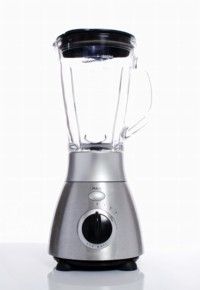How to Use a Blender
Q. I just received a blender for a wedding shower gift. Can you give me tips on how to use it and what I can prepare with it?
A. Blend, purée, liquify, and chop; those are just a few of the tasks the incredible blender can accomplish flawlessly. What would life be like without the musical whizzing and buzzing of your kitchen blender?
Your blender chops food and ice and blends liquids and solids together like a whirlwind. But that's not all! Blenders are best used to add air into a mixture such as a frothy drink. Depending on the size of your blender, it can process up to four cups of liquid -- including soups, sauces, and drinks.
Advertisement
Q. How do I choose the right blender?
A. When buying a new blender, look for one with a container that suits your cooking needs. The container can be made out of plastic, glass, or stainless steel and usually has a plastic lid.
Plastic containers are less expensive, do not break easily, and are not sensitive to changes in food temperatures. However, if you wash a plastic container in the dishwasher, it can scratch over time.
Glass containers are slightly more expensive, may break easily, and can be sensitive to changes in temperatures. Glass containers are much less likely to scratch in the dishwasher.
Stainless steel containers are perfect for blending frozen drinks. But the fact that they're steel means they're not transparent, so to see what's inside you have to stop the blender and remove the lid.
With some blenders, the container must be placed perfectly into the base or the motor will not start. When using a blender, never remove the lid from the container or the container from the base while the motor is running!
Q. What are some quick tips you can give me about using my blender?
A. Here are some basic blender tips you should keep in mind:
- Place the lid firmly on the container before starting the motor, and place your hand on the container lid while the motor is running.
- If the motor seems to be struggling at a low speed, add a little liquid and increase to the next higher speed to finish processing.
- Always turn off the blender and allow the blade to completely stop before removing the lid and the container.
- When making drinks that use carbonated beverages, prepare the recipe using all but the carbonated ingredient. Pour the blended drink into serving glasses then add the carbonated ingredient last.
- Try chilling the container before making cold recipes. Glass and metal containers can be chilled in the freezer and will remain cold when blending frozen drinks. This won't work for plastic containers.
- When blending hot liquid, leave the feeder cap open to release the steam. Start at the lowest speed and gradually increase to higher speeds.
- Be sure to add at least one cup of liquid to the container when chopping ice cubes.
- Use your blender to grate harder cheeses such as Cheddar or Swiss. Cut the cheese into cubes then refrigerate before adding to the blender. Add cheese cubes through the feeder cap while the motor is running.
- Make bread crumbs with your blender. Use stale bread for dry bread crumbs and fresh bread for soft bread crumbs. Add pieces through the feeder cap while the motor is running.
- Use your blender to grate fresh coconut, grind poppy seeds, reconstitute dry milk and frozen fruit juices, dissolve gelatin, and prepare instant puddings and shakes.
- Your blender can grind coffee beans, whole spices, crackers or nuts, and make nut butters.
Who doesn't love the smell and taste of freshly baked bread? Continue to the next page to find out how to choose and use a bread maker.
For more helpful kitchen appliance tips and recipes, see:
- Introduction to Cleaning Small Kitchen Appliances
- Introduction to How Food Processors Work
- Small Appliance Repair Basics
- Baking Cookies: Baking Shaped Cookies
- Chocolate Waffles Recipes
